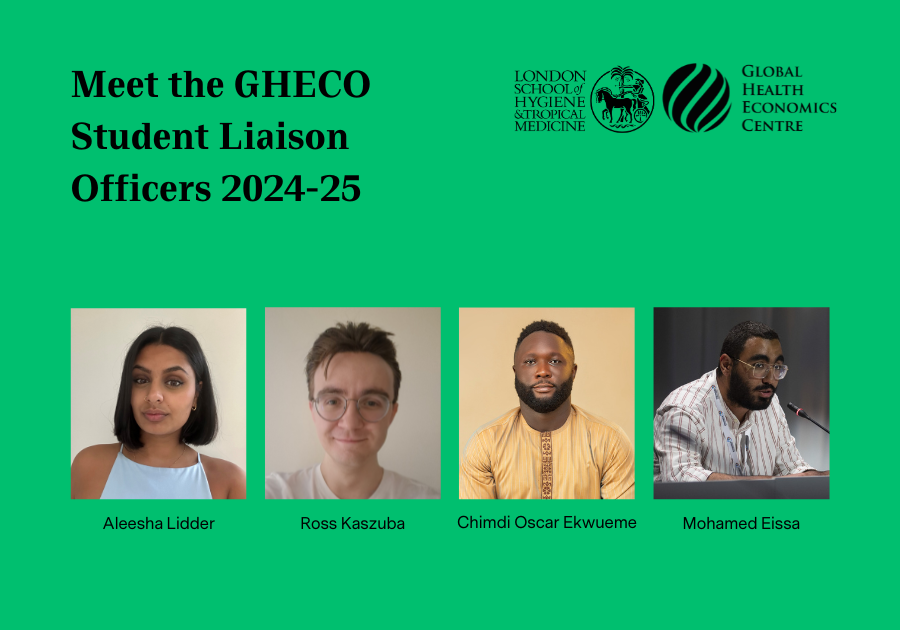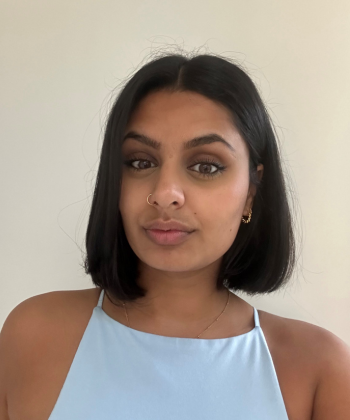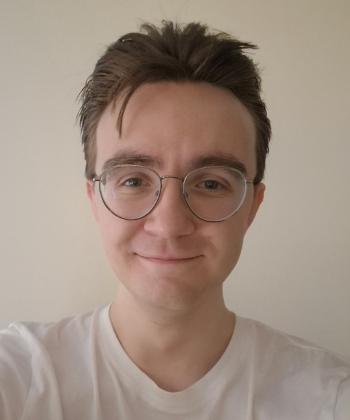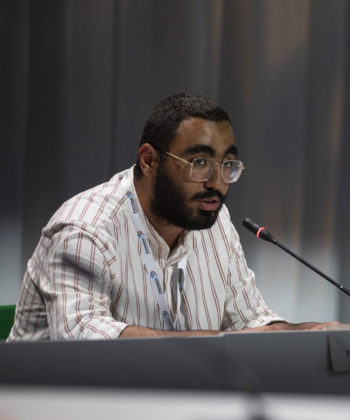
The Student Liaison Officers (SLOs) for the Global Health Economics Centre (GHECO) represent the student voice to the Centre and support students in their health economics studies. Throughout the academic year, they help organise events and networking opportunities for students to connect with researchers at LSHTM, and support the Centre’s communications.
We spoke to our 2024/25 cohort of SLOs to learn more about their passion for health economics and why they’re studying at LSHTM, and GHECO.
Spotlight on Aleesha Lidder
Aleesha Lidder brings a strong scientific background and a deep interest in health policy to the Global Health Economics Centre (GHECO). After completing a degree in Biomedical Sciences, Aleesha worked at GlaxoSmithKline (GSK), researching and designing novel medicines. This sparked her fascination with the regulatory framework of patents, and a broader interest in health policy and governance which ultimately inspired her to pursue an MSc in Public Health at LSHTM, and study at the intersection of health policy, governance, and health economics.
Aleesha believes health economics is a critical tool for shaping health policy and decision-making because understanding how scarce resources are allocated in healthcare, particularly in low- and middle-income countries (LMICs), is essential for designing equitable and sustainable interventions and improving healthcare systems. Beyond her academic pursuits, she is passionate about addressing the public health implications of climate change, an area where she sees policy and health economics playing a pivotal role in mitigating risks and driving reform.
If she could address one global health challenge through an economic lens, she would focus on achieving the financial sustainability of healthcare systems in LMICs, that can provide universal health coverage and better health outcomes for all.
Spotlight on Ross Kaszuba
Ross, a medical student from the UK, has taken a year away from his medical studies to pursue an MSc in Public Health (Health Economics). With a strong clinical foundation, he is particularly interested in how economics can be applied to infectious disease control and health system strengthening. His time at LSHTM is providing an opportunity to bridge his medical training with the analytical tools of health economics gaining a broader perspective on how economic principles shape healthcare delivery and policy.
Ross is drawn to the role of economics in modeling cost-effectiveness and its critical applications in pandemic preparedness and response. He sees economic modeling as an essential tool for designing efficient and equitable health interventions, especially in times of crisis, when resources must be allocated swiftly and strategically. His interest lies in advancing methods to more accurately estimate the cost-effectiveness of interventions and ensuring such analyses become standard practice in both national and international policy decisions.
In his leisure time, Ross enjoys taking advantage of LSHTM’s proximity to the West End for the theatre and live performances. He has also enjoyed meeting new people at LSHTM, and how much he’s learnt about health economics and medicine from the new friends he’s made. Looking ahead, Ross is excited to contribute to the growing field of health economics and to help integrate economic insights into policy frameworks that shape global health outcomes.
Spotlight on Chimdi Oscar Ekwueme
Chimdi has a medical degree from Nigeria and is currently undergoing his clinical residency in Public Health and Community Medicine with the West African College of Physicians. While working in Nigeria, he realised first hand that, beyond public health interventions, supporting health policies with sustainable, evidence-based financing mechanisms were essential to making the most of scarce health resources.
This realisation led him to pursue an MSc in Health Policy, Planning, and Financing at LSHTM, where he hopes to develop the skills needed to inform evidence-based policies that improve health financing and efficient utilisation of limited health resources. Chimdi's interest in health economics and its role in strengthening healthcare systems drew him to GHECO. Chimdi sees health economics as a vital tool for designing financial risk protection mechanisms, optimising resource allocation to ensure health systems in resource-constrained settings are both equitable and sustainable.
If Chimdi could tackle one major global health challenge using health economics, he would focus on drastically reducing out-of-pocket payments for healthcare in resource-constrained settings. He believes that engaging with the work of the Centre has given him the expertise needed to drive this change in Nigeria and advance universal health coverage, reduce financial hardship, and build a resilient health system. Outside of health economics, Chimdi loves discussing and analysing historical events through a policy lens, and following the ever-evolving landscape of global affairs.
Spotlight on Mohamed Eissa
Mohamed holds an MBBCH from Alexandria University in Egypt. He currently works as a Public Health Officer at the World Health Organization office in Egypt, while pursuing two master’s degrees: Health Economics at Cairo University and Public Health at the University of London. Given the subject of his two degrees, joining GHECO was the perfect fit for Mohamed to widen his scope of health economics, and gain in-depth perspectives from various stakeholders on how health economics is integrated and interlinked with public health issues.
For Mohamed, health economics is a strategic key to strengthening health systems. He believes that integrating economic perspectives into policy development, implementation, and evaluation can lead to more effective and equitable health outcomes. He sees health economics not just as a tool for financial management, but as a mechanism for ensuring the optimal use of scarce resources, maximising health benefits while promoting equity and sustainability. Mohamed believes that, within health economics, lies the solution to many of the current global health challenges.
If you enjoyed this article and would like to build a career in global health, we offer a range of MSc programmes covering health and data, infectious and tropical diseases, population health, and public health and policy.
Available on campus or online, including flexible study that works around your work and home life, be part of a global community at the UK's no.1 public health university.




